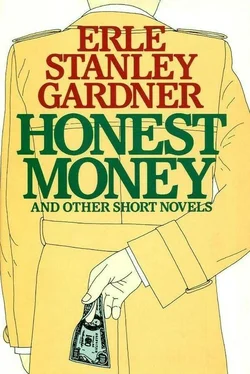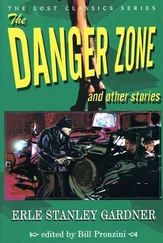“All right,” said Corning with a grin. “Are you going to pan me, or give me a boost?”
“That’s up to you,” said the columnist.
Corning raised his eyebrows.
“You know,” said Bigelow, “I like to give the inside facts a little bit before the public gets them. I like to give it a touch of spice, and give the impression of being very much in the know.”
Corning nodded once more, silently, warily, his eyes half slitted as they watched the man who had called on him.
“Now,” Bigelow said, still smiling with his lips, but his cold eyes fastened on the smoke which curled upward from his cigarette, “there’s been some talk going around town about you. They say that you have busted a lot of precedents, fought the political ring that’s supposed to be running York City, and are making a lot of money.”
Ken Corning said nothing.
“I just thought,” remarked Bigelow, “that if I should write up a little sketch for my column that you had whipped the big boys into line, and they were going to give you a break from now on, it might do you some good.”
“What are you getting at?” Corning asked.
“Well,” Bigelow said, “you’re representing a bum and a panhandler who’s got a murder rap on him, Sam Driver. The prosecution has got a dead open-and-shut case on him, but there’s been a rumor going around that you’ve got the D. A.’s office a little jumpy because you’ve managed to get some acquittals in cases they thought were dead open-and-shut.”
“Well?” asked Corning.
“Well,” said Bigelow, “there’s talk that the District Attorney doesn’t know exactly what to do in this Driver case. He’s got some circumstantial evidence, but it doesn’t show very much. If Driver should come out and change his story, and admit that he did the killing, but claim that it was done in self-defense, because he found out that Green had been mixed up in some pretty shady stuff that Driver didn’t approve of, there’s a pretty good chance the District Attorney would figure he didn’t have enough evidence to go on with a murder case, and he might let Driver get a plea of manslaughter.”
“What makes you think the D. A. would let Driver make a manslaughter plea?” asked Corning.
“Just a little inside stuff,” Bigelow told him. “Of course I keep my ear pretty close to the ground.”
“Okey,” said Corning. “Then suppose I don’t have Denver put up a self-defense story, and take the rap for manslaughter. Then what’s going to happen?”
The smile left Bigelow’s lips, his cold eyes fastened directly on Ken Corning.
“I’ve got orders,” he said, “to mention your name. If you did something that was pretty clever, I could write it up and give out the dope that you had been taken in on the inside. If you passed up a chance to make a clever play, and did something dumb, I’d probably have to write that you weren’t such big-time stuff after all; that you’d let a fast one slip through your fingers because you couldn’t use the old bean.”
Corning got slowly to his feet.
“All right,” he said, “I guess you’ve said all you were supposed to say, haven’t you?”
Bigelow pinched out the end of his cigarette, dropped it into an ashtray, regarded Corning thoughtfully, and then said slowly: “Yes, I guess I have.”
He started to walk from the office, but turned at the door.
“Let me know, will you?” he said. “Because I’m anxious to get your name in my column.”
“Don’t worry,” Corning told him, “I’ll let you know.”
The telephone was ringing when Corning closed the door of his inner office, behind Bigelow’s departing figure. He scooped the receiver to his ear, and heard Helen Vail’s voice.
“Listen, chief,” she said. “I followed her to a private automobile — a coupé. I picked up a taxi and tailed her. She got away, but I got the license number of the automobile before she gave me the slip.”
“Did she know she was being followed?” asked Ken Corning.
“I don’t think so, chief, It was just a bum break in the traffic.”
“All right,” said Corning, “what about the license number?”
“I telephoned in to the police registration department,” Helen Vail said, “and got a friend of mine on the line. I didn’t tell him, of course, what I wanted to know for. He gave me the registration.”
“All right,” said Ken Corning, “what was it?”
“The car,” said Helen Vail, “is registered in the name of Stella Bixel. She’s the widow of the man who was killed by the burglar in the country cabin last fall. You may remember the case...”
“Okey,” said Ken Corning, crisply, “that’s good work, Helen. Come on back to the office.”
Corning looked across his desk, into the speculative eyes of Edward Millwright, the expert on handwriting, fingerprints and questioned documents, whom he had asked to come in to see him.
“Can you,” he asked, “get access to the police files, or to the Bureau of Criminal Identification records?”
The handwriting expert squinted his eyes thoughtfully.
“I have done so,” he said, “on cases where I was working with the police, and once or twice on cases where I had uncovered some evidence which the police thought would be of value.”
“Could you get somebody else to look up some information for you and pass it out?”
“I might.”
“All right,” said Corning, “here’s another question. I understand that recently they’re taking fingerprints of bodies that go through the morgue.”
The expert nodded.
“I am representing,” said Ken Corning, “a man named Sam Driver, who is accused of the murder of Harry Green, a gambler, panhandler, and general bum. I don’t think anyone ever claimed the body of Green. I think it was finally buried, after an autopsy, at county expense. The body went through the morgue, and I think fingerprints were taken.”
“All right,” said Millwright, “what do you want me to do?”
“I want you,” said Corning, slowly, “to find out what’s funny about the case.”
“How do you mean?”
“There’s something funny about the case — something that I don’t know anything about. I don’t think it’s anything connected with Sam Driver, so I think it’s something connected with Harry Green, the murdered man. I want you to get those fingerprints and check them.”
“I could get the fingerprints,” said the expert, “the records of the morgue are open. But I’m not so certain about checking them; not the way you want them checked, anyway.”
“Don’t you know some peace officer who could wire the classification in to some of the central identification bureaus?”
“I might work that, yes.”
“All right, do that; and furthermore, I wish you to check up the fingerprints with any police bulletins that may be floating around, on unsolved crimes.”
“In other words, you think there’s something fishy about this man, Green, is that it?”
“I don’t know,” Corning said slowly, “but I’m going to find out. There’s something funny about the case, and pretty powerful influences are bringing pressure to bear on me, to make me handle it in a certain way.”
“Why should powerful influences be mixed up m a case involving a hobo?” Millwright wanted to know.
“That’s what I want to find out,” said Corning.
Millwright nodded, got to his feet.
“With any kind of luck,” he said, “I can let you know inside of twenty-four hours; otherwise, it’ll just be a slow and tedious process, with the cards stacked against me.”
He was shaking hands with Millwright, when Vare, the private detective, came into the room.
Vare waited until the door had closed behind Millwright, then sat down and pulled a list from his pocket.
Читать дальше












